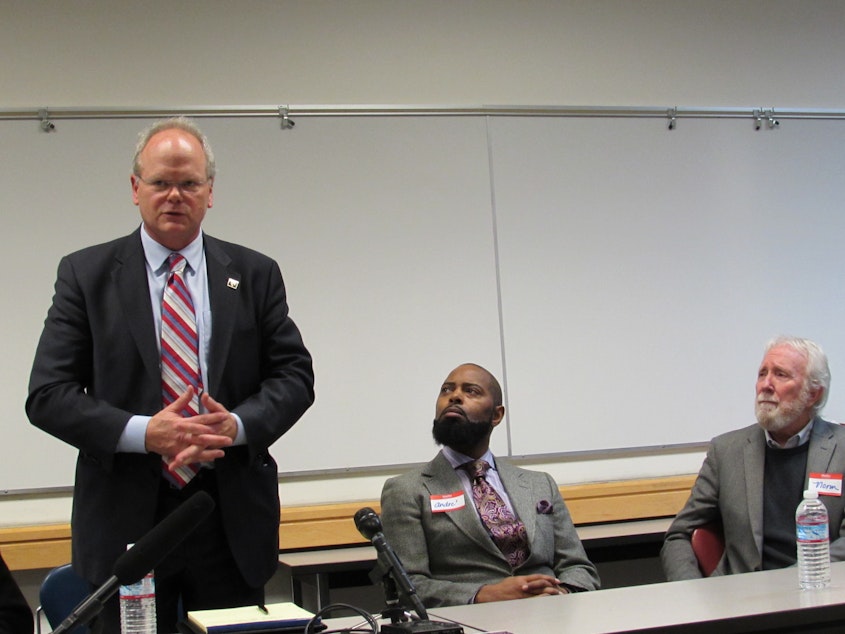Che Taylor was killed by Seattle police. Now the county is holding an inquest

An inquest is scheduled to get underway at the King County Courthouse this week in the death of Che Taylor. In February 2016, Taylor was shot by Seattle police in the Wedgwood neighborhood. Now a jury will hear more facts of the case.
The Seattle Police Department issued a statement saying Taylor reached for a handgun when he was shot by officers Michael Spaulding and Scott Miller. Police dashcam video doesn’t clearly show what happened. The police department's internal review found Taylor’s shooting justified.
Andre Taylor has become an activist on police accountability issues since his brother’s death. Taylor said he doesn’t expect big revelations from the inquest, but perhaps some details will emerge that provide consolation to his family. He said they’re also seeking records and evidence on their own.
“We have to go to our own investigation, hire people,” Taylor said. “That’s unfortunate because most families don’t have the resources to do that. Most families don’t even have the resources to have an attorney present when an inquest is presented. So it’s a real flawed process.”
At a recent community meeting convened by Taylor’s group, Not This Time, in Seattle’s Central District, King County Prosecutor Dan Satterberg said the inquest process is more transparent than the alternative, where prosecutors simply determine whether to file charges after reading a police report.
“All of the facts surrounding that death are discussed and the investigation is revealed in open court where anybody can watch it,” Satterberg said. “I will defend that process as superior to one that happens entirely on paper.”
The prosecutor then looks at the facts established in the inquest to determine whether criminal charges against police officers are warranted.
In Washington state, the longtime standard for prosecuting law enforcement officers has been receiving new scrutiny. The Seattle Times found that the current law, which requires showing that the officer "acted with malice," is an outlier nationwide. Only one officer in Washington has been criminally charged with illegal use of deadly force on the job in 30 years.
In November, a state task force recommended changes to state law. Satterberg said the Washington Association of Prosecuting Attorneys supports a version of that.
“I would support getting rid of ‘malice,’ and I think most prosecutors in the state would as well,” Satterberg said. But he said prosecutors want to retain — and define — a provision shielding officers in some cases.
"We do give police officers a little extra deference because they’re the ones that have to run toward danger when the rest of us can run away,” he said. To that end, Satterberg said he supports language that would shield an officer from prosecution if he or she acted “in good faith,” which he said should be defined as acting the way a “reasonable” officer would have acted.
“If they make a simple mistake and somebody dies — and it’s a good-faith mistake and any other officer would have made that same mistake — then that officer shouldn’t go to prison,” Satterberg said.
He gave the example of the reserve deputy in Oklahoma who meant to use a Taser and accidentally shot someone last year.
Satterberg said prosecutors are backing these changes, but police labor unions are not. However he said the possibility of organizations like Not This Time working to bring ballot initiatives on the issue is a motivating factor for legislators.
He said he does not support the effort to make it a hate crime to harm a a law enforcement officer.
“I do not support that at all, there’s no historic basis to do that,” he said. “The people who are in the classes that are protected under the state’s malicious harassment laws, these are humans who have immutable characteristics of race or ethnicity or sexual orientation or things where there’s been a long history that because of things they can’t change, because of who they are, they are the targets of harassment.”
He said “there are plenty of unpopular occupations,” including his own, but none have ever been considered for this type of protection.
However, crimes against law enforcement are already considered an aggravated offense, eligible for stronger criminal penalties.

